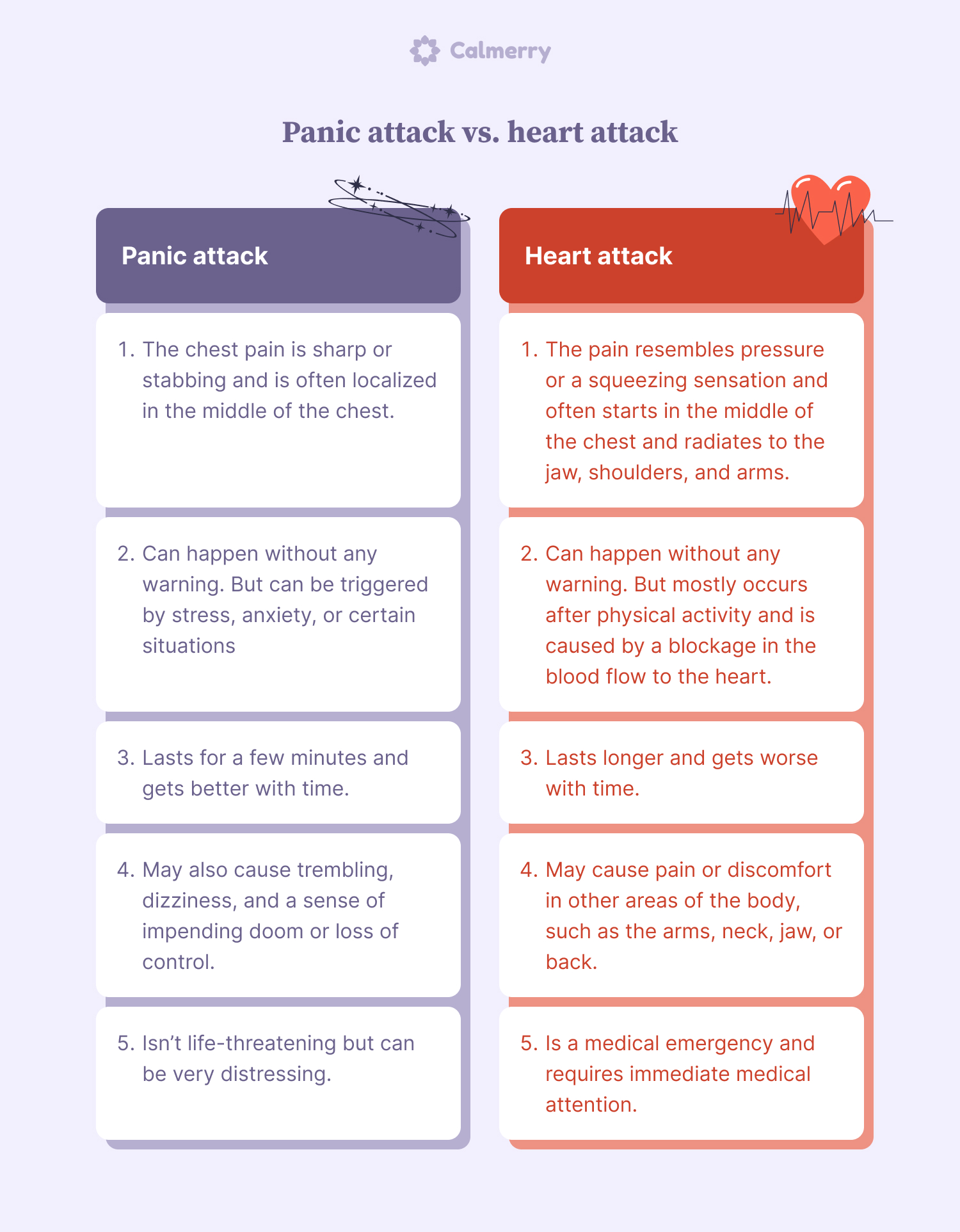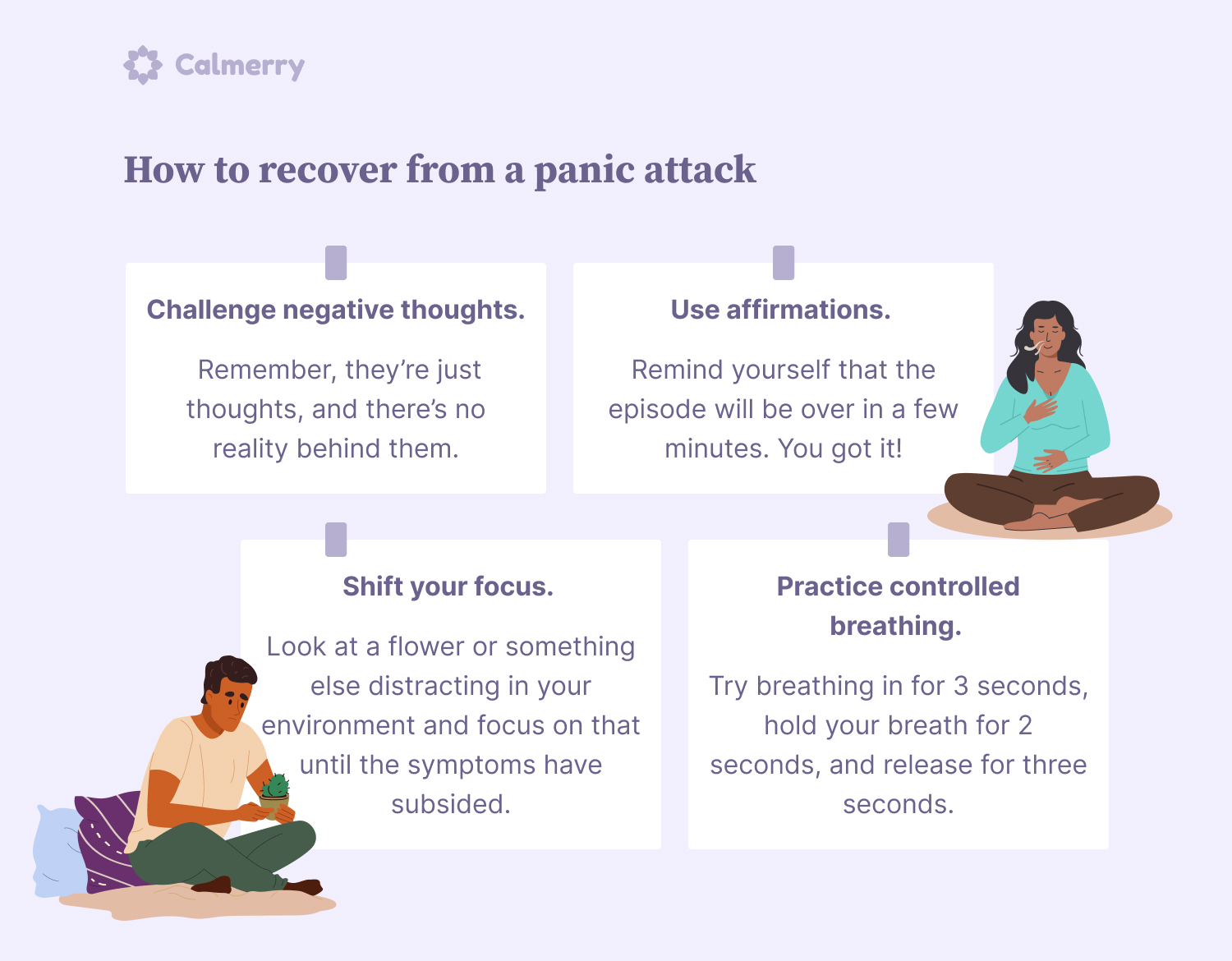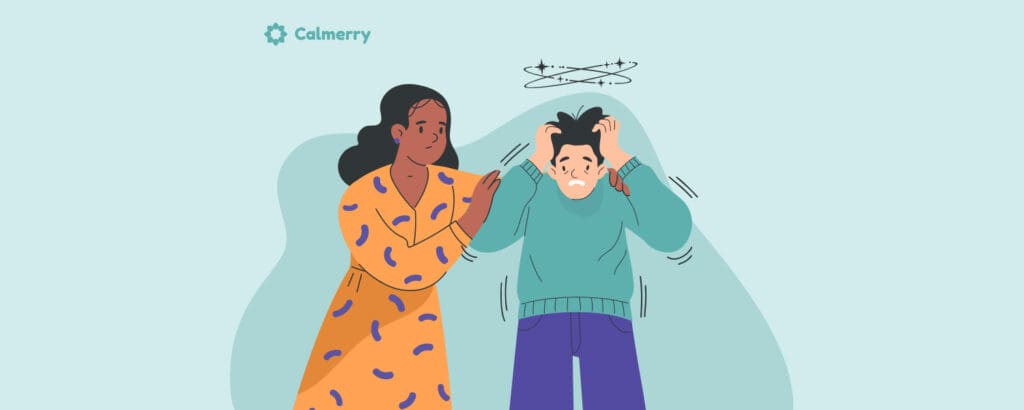Panic Attack vs. Heart Attack: How to Tell the Difference

In this article
Differentiating between a heart attack and a panic attack can be challenging. It’s even worse if the person has never experienced the symptoms before. You see, both episodes share similar symptoms. What’s more, someone can have a panic attack when they’re getting a heart attack, which further complicates the situation.
For this reason, it’s crucial to understand the difference between a panic attack and a heart attack. This information can be life-saving. Here’s everything you should know about panic attack vs heart attack.

What causes a panic attack?
A panic attack is an intense feeling of anxiety and fear which occurs suddenly without any warning. When you’re experiencing a panic attack, you may feel like you’re losing control, dying, or having a heart attack.
The causes of a panic attack remain unknown. However, certain factors may play a role. These include:
- Stress-prone temperament
- Genetics
- Major stress
- Changes in brain function
In the early stages, panic attacks may happen without warning. However, over time, they’re often triggered by something.
What causes a heart attack?
You experience a heart attack when one or more of your coronary arteries are blocked. The condition is referred to as coronary heart disease and is among the major causes of a heart attack. You may experience a complete or partial blockage of the coronary arteries.
Some of the risk factors of heart attacks include:
- Age. Women over 55 and men above 45 years of age are more likely to have heart attacks.
- Smoking. This includes tobacco smoking and long-term secondhand exposure to cigarette smoke.
- Obesity. Obesity is linked to diabetes, high blood cholesterol, and high blood pressure, which increase the likelihood of a heart attack.
- High blood pressure. Hypertension can damage the arteries leading to your heart. It’s worse if you have other lifestyle diseases like obesity.
- High blood cholesterol. A high level of low-density lipoprotein (LDL) narrows the arteries.
- Genetic predisposition. You’re more likely to have a heart attack if it’s prevalent in your family.
Physical and emotional symptoms during a panic attack
Understanding the symptoms to look out for during a panic attack allows you to take the right steps. Most people experience the following symptoms:
- Increased heart rate
- Pain that improves with time
- Tingling hands
- Shortness of breath
- Sweating
- Sudden onset during extreme stress or anxiety
- Symptoms resolve within 20 to 30 minutes
Physical and emotional symptoms during a heart attack
If you suspect that someone may be having a heart attack, there are certain symptoms to look out for:
- Near fainting
- Pressure and squeezing pain in the chest
- Sudden onset after physical activities like climbing stairs or running
- Symptoms that get worse over time
- Pain that radiates to the shoulders, jaw, and arms
- Nausea and vomiting
- Shortness of breath
If you notice any of the following symptoms, call 911.
Key distinctions between panic attack vs. heart attack
As you can see, heart attack and panic attack symptoms are quite similar. Therefore, if you’ve never witnessed either of these conditions, you may easily confuse them.
However, there are certain distinctions between a heart attack and a panic attack you can look out for to make the right conclusion. These include:
The chest pain is different
Although you experience chest pains with both conditions, the characteristics of the pain are different. When you’re having a panic attack, the chest pain is sharp or stabbing and is often localized in the middle of the chest.
On the other hand, a heart attack resembles pressure or a squeezing sensation. This pain often starts in the middle of the chest and radiates to the jaw, shoulders, and arms.
Onset
Both panic and heart attacks can happen without any warning. However, in most cases, a heart attack occurs after physical activity. This can be either a strenuous or light physical activity.
Duration
The duration of the symptoms will also give you a clue about what condition you’re dealing with.
- Heart attack symptoms last longer. They’re mild at the start and get worse with time.
- On the other hand, panic attacks only last for a few minutes and get better with time.
Can a panic attack cause a heart attack?
A panic attack cannot cause a heart attack. As we’ve mentioned, one or more of your coronary arteries must have a blockage for you to experience a heart attack. However, anxiety and stress may increase your risk factor for a heart attack.
Research shows that people with anxiety disorders are at a higher risk of getting a heart attack due to heart rate variability (HRV).
HRV refers to the time between each heartbeat. A healthy person has a high HRV, which is characterized by efficient shifts in heart rate. People with low HRV have an inefficient heart rate, which increases their risk of heart disease.
How to recover from a panic attack
When you’re experiencing a panic attack, it’s not unusual to be overwhelmed with fear. However, over time, getting over the pain and getting back to a normal state can be challenging.
There are several things you can do to manage a panic attack and calm down.

Challenge negative thoughts
Negative thoughts can induce a panic attack or make an episode worse. If you’re prone to panic attacks, it may help to challenge your negative thoughts.
Remember, they’re just thoughts, and there’s no reality behind them.
Use affirmations
It also helps to use coping statements during the attack. Remind yourself that the episode will be over in a few minutes.
If fear creeps in, try to remember all the other times you got through an episode without anything serious like dying or a heart attack happening. When you do this, you’ll be calmer, and your symptoms are more likely to resolve faster.
Shift your focus
Negative thoughts often accompany a panic attack. In the middle of it, you may start thinking about death and bad things happening to you. Shift your focus instead. Look at a flower or something else distracting in your environment and focus on that until the symptoms have subsided.
Practice controlled breathing
Most people hyperventilate when they’re having a panic attack. This involves taking deeper breaths than usual. This breathing pattern causes shortness of breath, disorientation, dizziness, and chest pains.
Learning how to control your breathing will shorten the panic cycle and relieve your symptoms. Try breathing in for 3 seconds, hold your breath for 2 seconds, and release for three seconds.
An intense panic attack can leave you physically and emotionally exhausted. These side effects of panic attacks are referred to as a panic attack hangover and may last for hours or even days.
Still, you will recover, and there are many ways to cope with it, including:
- Getting a good night’s rest
- Doing a light workout
- And practicing mindfulness.
It’s also helpful to talk to an anxiety therapist to learn to manage your symptoms and gain control over your life.
Heart attack vs. panic attack: when to see a doctor
Differentiating between the symptoms of a panic attack vs. a heart attack is easier said than done. If you’re in doubt, the best thing is to seek medical attention.
Seek emergency treatment if you experience sudden or severe chest pain, pain radiating to the arm or jaw, and pressure that lasts more than two minutes.
If you’ve tried different coping mechanisms for your panic attacks and nothing works, it’s advisable to get expert help.
A therapist will diagnose the cause of your panic episodes and suggest clinically proven coping mechanisms to manage your symptoms. Calmerry offers access to online therapy for everyone so that you can have a session from the comfort of your own home. Contact us and start your therapy journey.
online therapy
live video session




